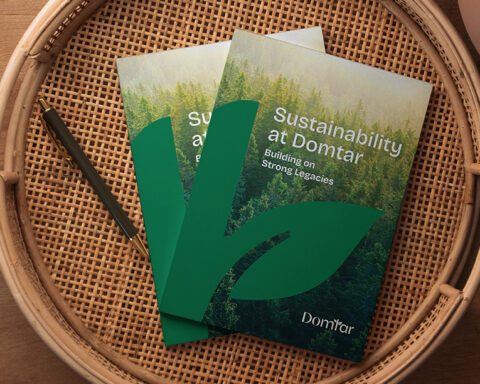Canada is already seeing the effects of climate change, and the insurance industry is paying close attention. As extreme weather events become stronger and more frequent, the Insurance Institute predicts that average annual severe weather claims paid by insurers in Canada will more than double between 2020 and 2030, increasing from $2.1 billion to $5 billion per year.
Government and consumer responses to climate change also affect the insurance industry. The transition to a low-carbon future, while necessary, introduces considerable investment risk. Insurers are therefore doubly motivated to prepare for climate-related risks and to do their part in addressing the root problem.
Insurance companies including Co-operators, Definity, and Munich Re have set ambitious environmental goals and are already bullfrogpowering their operations with 100% green electricity. These insurers also believe they have a bigger role to play by helping their clients and society at large prepare for and mitigate climate change.
What role should the insurance industry play in addressing climate change?
Insurance has wide-ranging influence, and insurance companies can help decarbonize much more than their own operations.
Chad Park, Vice President of Sustainability & Citizenship at Co-operators, notes that as climate risks increase, people in our communities – especially those who are marginalized or vulnerable – are bearing the financial, social, and emotional cost of climate catastrophes. “As insurers, financial protection against risk is core to our purpose,” he said. “But we can go further. We can increase our efforts to prevent losses by increasing risk awareness and investing in climate adaptation.”
Brendan Seale, AVP and Head of Environment, Social & Governance at Definity, encourages cross-sector collaboration on climate issues. “The insurance industry is uniquely positioned – and has a vested interest – to address human contributions to climate change,” he said. “In addition to reducing their own carbon emissions, insurance companies can influence and collaborate with their suppliers and policyholders to reduce emissions and be better prepared to thrive in an increasingly unstable climate future.”
Silke Jolowicz, Head of Sustainability at Munich Re, highlights the key role that insurance can play in identifying climate risks and opportunities, and then developing solutions for loss minimization. “Slowing the pace of climate change requires new technologies for power generation, transportation, energy storage, and industrial production,” she said. “It’s important to create insurance solutions for such technologies, smoothing the path to market entry.”
Thanks to their advanced understanding of risk and their close relationships with clients, insurers are well positioned to help individuals and other industries reduce their carbon footprints and increase climate resilience. New insurance products and green investments can also support advancements in cleantech, allowing insurers to have a far-reaching impact on climate.
Helping clients adopt more sustainable practices
Insurers benefit from helping their clients understand and minimize their climate risk, making them a powerful driving force for more sustainable decisions at the corporate and personal level.
Jolowicz reminds us that insurance companies have a wealth of information that can be used in evaluating risk. “Education and knowledge are key, and partnering with an insurance company can help companies fully understand their exposure to climate related risk and how they could evolve because of climate change,” she said. “For instance, Munich Re has a product called the Location Risk Intelligence Platform. It is a comprehensive software solution to analyse and to manage physical risks of natural hazards and climate change, based on the largest and most comprehensive expertise worldwide gained from 141 years of risk assessment and management, as well as 15 years of continuous product development.”
Co-operators is working with its partners to build back better, keeping resiliency and sustainability in mind before and after a disaster occurs. “For example, we work with contractors who rebuild damaged homes with more sustainable building materials,” Park said. “We can also reclaim waste materials like shingles or drywall to be part of the circular economy.”
Definity offers financial incentives that motivate and help clients to make environmentally friendly choices. “We have green endorsements for property claimants that provide additional funds to implement more climate resilient or environmentally friendly solutions,” Seale said. They also offer additional coverage limits to commercial clients that meet certain environmental criteria.
By working with clients to educate them about climate risks and incentivize sustainable decisions, insurers can facilitate a wide variety of green practices.
Supporting new climate initiatives
Insurance companies have a massive amount of capital at their disposal, and the investments they choose can support our collective efforts to slow climate change.
Definity recently committed to achieve net-zero emissions for their operations and investments by 2040 or sooner. “Choosing green energy from Bullfrog Power enables us to clearly demonstrate our commitment to achieving an operational goal, while providing our financial support for the ongoing development of a clean electricity system across Canada,” Seale said. On the investment side, Definity has set interim targets and will reduce the greenhouse gas intensity of their holdings over time.
Munich Re sees responsible investments that reconcile economic, environmental, and social requirements as the basis of a successful business strategy. “Because our business model as an insurer has a long-term focus, sustainability criteria in investment play a key, strategic role,” Jolowicz said. Increasingly, investments that prioritize environmental, social, and governance criteria are seen as a way to promote public good and limit investment risk from climate hazards and more.
For Co-operators, an investment portfolio is a catalyst for a more sustainable society. “We exist to provide financial security for Canadians and our communities,” Park affirmed. “Anything that threatens that security – whether climate change, social inequality, mental or physical health challenges, or food insecurity – we are committed to proactively addressing.” Co-operators puts more than 21% of their invested assets, more than $2.6 billion, into impact investments that aim to solve pressing environmental and social challenges. Their target is to dedicate 60% of their portfolio to impact investments and investments that support the transition to a resilient, sustainable, low-emissions society by 2030.
There is vast potential for financial institutions like insurers to choose investments that make communities more sustainable, healthier, and more resilient in the face of climate change.
Insurance with impact
Sustainability-focused insurance companies have the ability and the motivation to educate their clients about environmental risks, encourage and incentivize greener practices across industries, and fund new climate solutions through impact investments.
Companies like Munich Re, Co-operators, and Definity are setting positive examples for the insurance industry by driving climate solutions for a better tomorrow while providing financial security for communities today.
Co-operators, Definity, and Munich Re shrink their carbon footprints with Bullfrog Power’s green energy. Click here to learn more.







